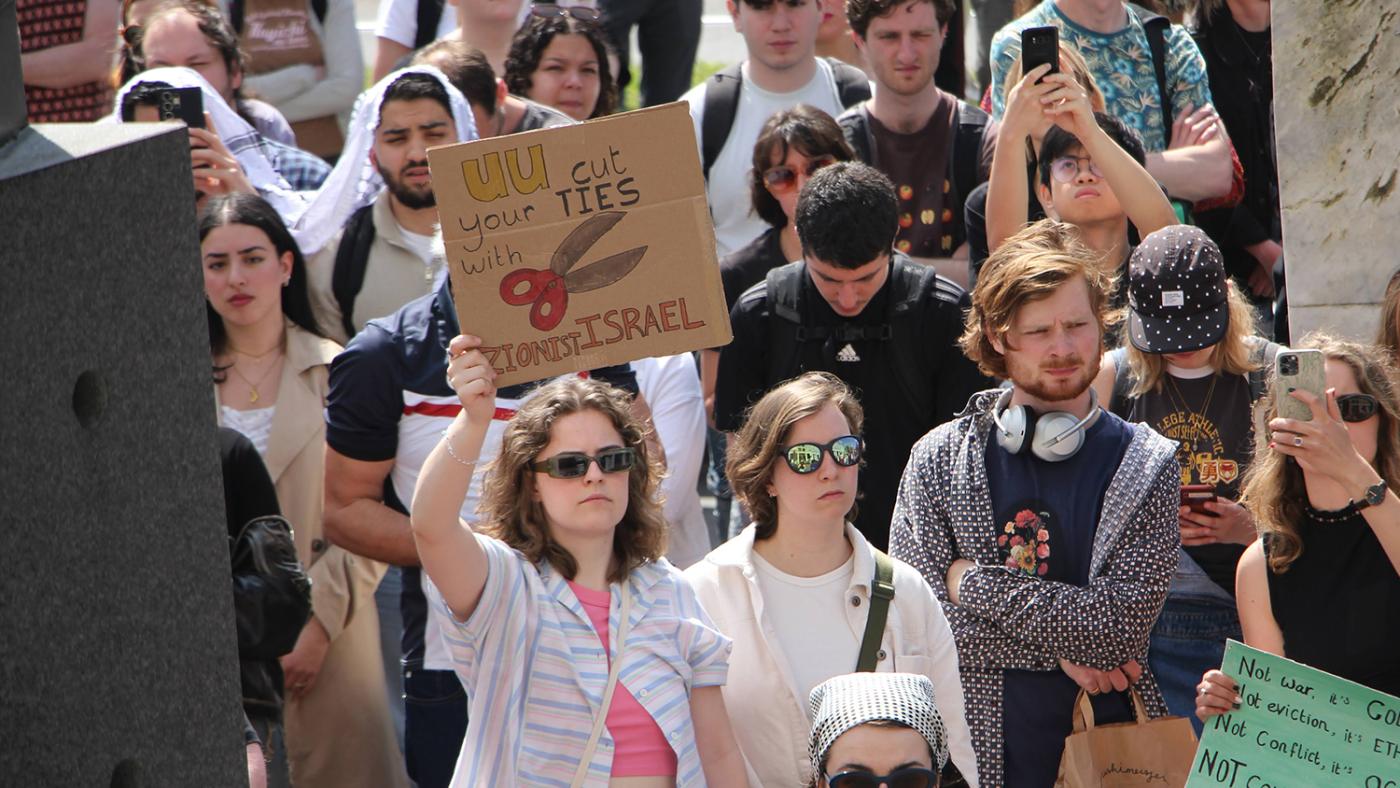‘Take it as encouragement’
Dutch politicians interfere with academic freedom

MP Joost Eerdmans (JA21) tabled a motion during a debate on "safety" in the higher education sector. He proposed that the cabinet and higher education institutions should get together to draft a document "containing concrete measures each institution would take to strengthen academic freedom."
The motion argues that students and academics should be able to discuss things openly. According to the MP, academic freedom has been "declining" in the Netherlands. As examples, the MP mentioned social safety, freedom of expression, protection against ideological pressure and the efforts to combat intimidation and threats against academics, all in the same breath. During the debate, he gave other examples of how academic freedom is supposedly being threatened. "If you are pro-Trump or climate-critical, you have a tough time at the university. Palestinian flags are hanging in the halls of some universities," he said.
The Minister of Education, Eppo Bruins, found the motion unnecessary, partly because universities have long been working to protect endangered scientists. In addition, he talks to the Royal Netherlands Academy of Arts and Sciences (KNAW) frequently. The academy, which the minister called "the conscience of science", published a report on academic freedom in 2021.
Even so, the motion got a majority in the House of Representatives. The coalition parties were split: PVV, VVD and BBB were in favour, while NSC voted against it. The opposition was also divided. SP, CDA and Denk voted against it, while GroenLinks-PvdA and D66 supported the motion.
"Most threats to academic freedom are outside universities," reacts André Nollkaemper, a Professor of International Law and Sustainability who chairs KNAW's Committee on Scientific Freedom.
What kind of threats do you mean?
"Universities' funding, polarisation in society, the debate about knowledge security... All of these things affect academic freedom. Such threats have deep causes and you cannot blame universities for them. That said, we should monitor certain things happening at universities right now. Sometimes, threats to the freedom of scholarship, free debate, free speech, and the freedom to invite guest speakers appear even within universities themselves."
Will such a motion help change this situation?
"Take it as encouragement. Universities are always responsible for promoting academic freedom, so they should always look for ways to do that."
How big is the problem?
"A survey of students and faculty about self-censorship showed that 14 to 28 per cent of lecturers felt restricted in their ability to express themselves to students or hindered when teaching sensitive topics. Among students, 34 per cent didn't feel they could talk to their lecturers. So, this is a task for universities to tackle."
Having to think for a moment before expressing your opinion is not an immediate threat to academic freedom.
"No, it is not necessarily strange when that happens. Take the discussion about Gaza, genocide and discrimination, for example. I've taught classes about Srebrenica and the Balkan War, and there were students from that region in my class. It was extremely sensitive. You must be aware of the other person's position, which sometimes means being a little bit more reserved".
As an academic, did you ever feel your academic freedom was being curtailed?
"No. I have had several debates on Israel. There were a few sensitivities, but I never felt restricted. However, the problem is evident at the University of Amsterdam, where both sides of the spectrum feel as though they can't speak their minds. Students and staff who stand up for the interests of Palestinians feel it just as much as Jewish students and researchers."
Academic freedom is different from the freedom to hold up a banner, isn't it?
"That's right, academic freedom is not the same as freedom of speech or the freedom to demonstrate. Let's take sit-ins and open lectures as an example. In that sort of activity, protesting, teaching and debating are merged. The principle should be that staff and students treat each other respectfully, but such things can be quite fierce."
What to do when people feel unsafe just because their point of view is being discussed?
"Views on sensitive topics can differ on political and ideological grounds. Academic freedom depends on social safety, which is why social safety deserves attention, but academic freedom is not the same as social safety. The motion pulls academic freedom into the realm of social safety, and I don't think that's wise."
To cooperate or not to cooperate?
Universities and universities of applied sciences reacted lukewarmly to the motion. "We are curious to see how the minister intends to elaborate on it," said a spokesperson for the association of Dutch universities, UNL. "We will have to wait and see what he will do to determine if we can cooperate with this and, if so, how." The universities of applied sciences are also waiting to see what the minister will do about the motion.
DUB recently talked to Rector Henk Kummeling about academic freedom at Utrecht University. The interview was split into two articles. The first one is titled "If a conversation consists of making demands, that is a complicated way of talking" and the second one, "Lecturers should not impose their opinions while teaching."
Netherlands drops in academic freedom ranking
The Netherlands does not have a good position on the Academic Freedom Index, in which countries score between 0 and 1 point. North Korea is at the bottom, while the Czech Republic is number one. The Netherlands obtained 0.79 points, less than Botswana, Peru and Suriname. It is also behind Germany (0.93).
The Netherlands is also among the laggards when one only considers the European Union. It is only ahead of Greece, Poland and Hungary. Only a few years ago, the Netherlands was among the leaders. "Campus integrity" is a category where the Netherlands scores worse. Interference with students and researchers on campus seems to be increasing.
The exact cause isn't evident. KNAW will soon publish an analysis of the country's low scores on academic freedom rankings.